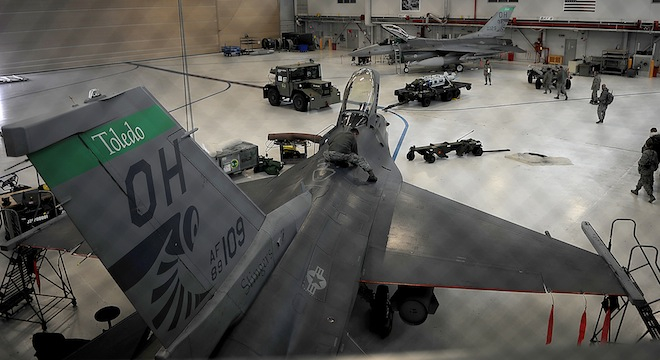TINA CASEY
Republicans recently had themselves a good laugh over President Obama’s enthusiasm for biofuel made from algae, but they might want to stifle that chuckle when it comes to another modest-seeming but potentially important feedstock for biofuel, camelina.
The weedy little plant is slowly but steadily growing a fan base in the U.S. Air Force.
As reported by the Air Force’s Tech. Sgt. Mareshah Haynes on Wednesday, the Ohio Air National Guard’s 180th Fighter Wing has been conducting extensive field tests of a 50-50 blend of camelina biofuel and conventional fuel on F-16 fighter jets and so far the results are promising.
The test program builds on a series of public demonstrations last year by the Air Force’s iconic Thunderbirds aerial team, which also used F-16s fueled with a 50-50 blend.
The camelina tests are just one part of an Air Force program to achieve fleetwide certification for a range of biofuel blends by 2013. So far, the A-10 Thunderbolt II, the F-15 Eagle, the C-17 Globemaster III, and the F-22 Raptor have been tested and certified.
Along with camelina, the Air Force is testing biofuels using other seed oils, animal and vegetable fats, and waste greases.
According the Col. Col. Scott Reed, Commander of the 180th Maintenance Group, the switch to a camelina biofuel blend is actually going much more smoothly than a petroleum-to-petroleum fuel shift the Air Force made back in the 1990’s.
“When we first started this we were a little concerned because a few years ago we made the switch from JP4 to JP8 jet fuel,” Col. Reed recalled in a press statement. “The difference between the two caused a few hiccups initially. Some of the gaskets and O-rings didn’t expand as they normally would in the presence of the fuel, so we had leaks.”
In contrast, according to Reed, there has been “absolutely no noticeable difference whatsoever” using the camelina biofuel blend.
Part of the Air Force’s goal in certifying the new blends is to ensure that they are “drop-in” ready. That not only means they can substitute for JP-8 without sacrificing performance in the air, but they can also do not require any engine modifications or changes in the fueling infrastructure including transportation, storage, pumps and hoses.
That saves money on crew training as well as on equipment and maintenance.
Meanwhile, the last laugh might be on the algae-mockers because the U.S. Navy has also embarked on a biofuel program that not only includes vegetable and animal oils but algae as well.
In fact, the Navy’s program goes far beyond testing algae biofuel on its own vessels and aircraft. It also includes strategic public and private partnerships aimed at securing a reliable algae biofuel supply chain for its domestic operations and globally, too.
Last summer, President Obama announced a new partnership between the Navy, Department of Agriculture and Department of Energy to get more biofuels including algae into production, as part of his much-publicized bus tour through the Midwest.
The Navy has also teamed up with shipping giant Maersk to test algae biofuel on ocean going cargo ships, and it has partnered with the U.S. biofuel company OriginOil to produce a drop-in algae biofuel that conforms to both the Navy’s standards and NATO fuel standards, with the ultimate goal of establishing a network of algae biorefineries in strategic regions around the globe.
One emerging strategic regions would be the Asia Pacific, as described in January by President Obama in a major speech on national defense, and in that regard the Navy and OriginOil are already on the job.
Last month, OriginOil announced the formation of an algae biofuel venture to begin constructing biorefineries in Australia and the U.S., and also last month Navy personnel attended a major biofuel conference in Australia to promote its interest in the international biofuel market.
What was it that Gandhi said, “First they ignore you, then they laugh at you…?”






